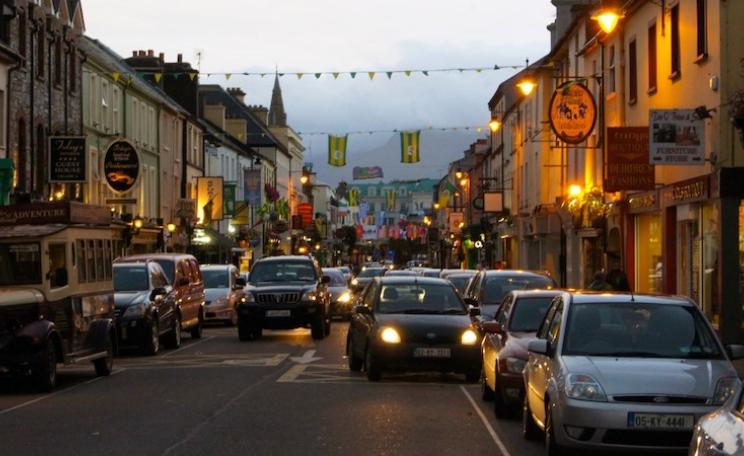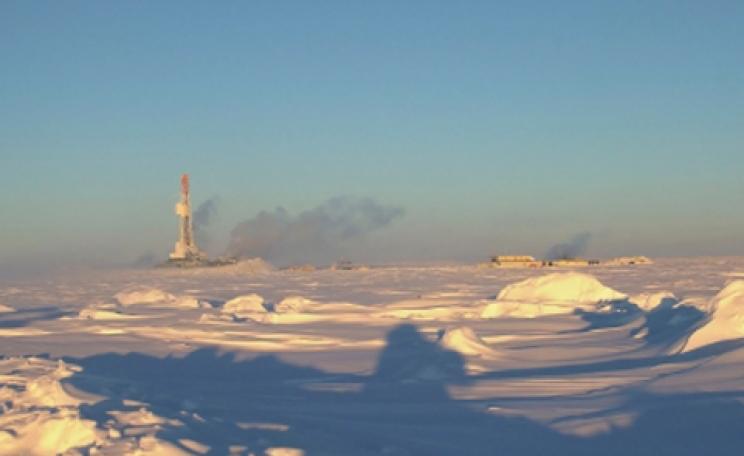One of the last acts of the outgoing Fianna Fail government in Ireland last month was to approve a planning application by oil and gas giant Shell to build an onshore pipeline in a remote and beautiful corner of western Ireland - the parish of Kilcommon Erris in County Mayo.
The pipeline is part of a much bigger construction project to bring gas from the Corrib gas field, 83km out in the Atlantic, onto shore and 9km inland to a new, purpose-built refinery at Bellanaboy Bridge. Shell says the Corrib field could provide up to 60 per cent of Ireland's gas, at peak supply.
Many different planning applications have been made for the different components of the project, each wending their way tortuously through the planning system, with the result that local residents have been fighting it for more than 10 years. The campaign became increasingly bitter and in 2005, five men were jailed for 94 days for breaching a court order to allow Shell workers onto their land to begin preparations for the pipeline. The land was subject to a compulsory purchase order. Protestors also blockaded the site of the new refinery and were forcibly removed by hundreds of baton-wielding police.
The previously quiet, rural parish had enjoyed the second-lowest crime rate in Ireland and locals looked on in horror as hundreds of police were bussed in to enforce Shell's right to build the refinery. The refinery is now almost complete and so is the undersea part of the pipeline. The last remaining piece of the jigsaw is the onshore pipeline. Thanks to local campaigners, Shell has been forced to propose a new route for it, keeping away from the village of Rossport. Shell has also agreed to reduce the pressure inside the pipe because of safety concerns.
However, locals are still far from happy and have vowed to continue their protests. In addition, the Irish National Trust is seeking a judicial review, to overturn the Irish government's approval of the new pipeline last month. Shell's pipeline will cross Natura 2000 sites, which were created under European law to provide protected habitats for rare and vulnerable birds. Charles Stanley-Smith, chair of the trust, believes that other protected habitats in Ireland could be threatened if the Shell pipeline decision is allowed to stand: 'It would set a precedent. We want to make sure the planning rules are applied properly.'
Film reveals protestors story
A documentary film, The Pipe, about the local community's campaign against the Corrib Gas project, will be shown in London cinemas this month, as part of the Human Rights Watch Film Festival. Directed by Risteard O'Domhnaill, The Pipe should receive a limited UK cinema release later this year and a TV screening is under negotiation. The film mixes footage of the idyllic Mayo countryside with violent clashes between police and protestors, who are overwhelmingly local people, many well into their middle age, rather than radicals who have come from outside to stir things up. One goes on hunger strike in an effort to halt work on the pipeline while others risk life and limb by placing their fishing boats in the path of Shell's leviathan pipe-laying ship. Former Irish Prime Minister Bertie Ahern is shown in an interview dismissing the protestors as law breakers.
O'Domhnaill, who works as a freelance news cameraman for Irish TV companies, made the film because he felt the mainstream Irish media was ignoring the protestors' story. 'It is a peaceful community, of farmers, fishermen, housewives, and it was awful to witness them dragged along a road by their own police force... they'd be pulled, dragged, pushed into ditches, then there'd be a baton charge.' The protestors have made unsuccessful calls for the refinery works to be built offshore, or in an uninhabited coastal area, rather than 9km inland, close to nearby villages.
Irish politicians and Shell
In the decade that has elapsed since work first began on the development, O'Domhnaill believes locals lost faith in their government and the planning process. An initial application to build the refinery at its current site was rejected by a planning inspector, but that decision was overturned by the more senior Irish Planning Board.
According to O'Domhnaill, this reversal was a result of political pressure exerted on the board by Ahern. Powers of compulsory purchase, to forcibly acquire land for the onshore pipeline, were granted to Enterprise Oil, which was later taken over by Shell. Yet the farmers who owned the land were jailed for physically resisting the laying of the pipeline.
There was a perception that the state was being used to protect Shell's profits rather than the rights of the locals. According to O'Dohmnaill, the events around the Corrib gas project reflect a wider malaise in Ireland, whereby politicians are too willing to do the bidding of big business. Ireland was recently forced to take an IMF loan to shore up its finances after the collapse of its banks and the bursting of its property bubble. This led to a resounding defeat for the Fianna Fail party in last month's elections. 'The politicians of our country put private powerful interests above that of the public with devastating consequences - we've seen it with the banks, the church and the property developers,' says O'Dohmnaill.
 |
| Map showing route of the proposed Shell pipeline in County Mayo, Ireland |
Shell says the refinery had to be built onshore rather than offshore for a range of economic, environmental and safety reasons: 'The harsh Atlantic location and deep water make Corrib unsuitable for offshore processing.' It also argues that the alternative coastal site at Glinsk is unviable because of its remoteness, its 100-200 metre cliffs and its exposure to bad weather. The official approval for the revised route of the onshore pipeline was welcomed by Terry Nolan, managing director of Shell E&P Ireland Ltd, as 'good for Mayo and for Ireland'. Shell says the scheme will not damage the environment or endanger public health.
In a statement, Shell quoted the verdict of the Irish Planning Board that the project 'would help safeguard the energy security of the state, would benefit the Western region of Ireland, would not seriously injure the amenities of the area... would not be prejudicial to public health or to public safety [and] would not be likely to have significant effects on the environment.'
Protestors continue battle
Yet two of the protestors featured in O'Domhnaill's film have vowed to fight on. Pat O'Donnell, the fisherman who put his boat in the path of the pipe-laying ship, was arrested many times and had his boats impounded, says: 'The protests will continue... I will exercise my fishing rights in the bay, they've got to lay an umbilical cord [on the sea bed, between the offshore gas field and the refinery onshore], so they'll probably have to arrest me again or they'll have to kill me or take the boat off me.' He adds, 'All along we had been protrayed in Irish media as terrorists or thugs. Anyone that goes to see the film will see plainly who the bullies and thugs were - it certainly wasn't the farmers or fishermen, it was the state.'
Mary Corduff, whose husband Willie was one of the five farmers imprisoned in 2005, is still unhappy about the new route, despite Shell's agreement to lower the gas pressure inside the pipe, take the pipe further away from housing and to bury large sections of it in a tunnel, encased in concrete. 'The community are not happy about this, it has been forced upon people,' she says. 'Shell are piecing together the project bit by bit. They get permission after permission on the back of having got the previous permission. Nothing can make my mind say, "this is right"'.
Useful links
The Pipe film
| READ MORE... | |
 |
VIDEO How to shut down a Shell petrol station... in style On 15th May, protesters shut down the Islington Shell petrol station for five hours in a non-violent, 'party at the pumps'. Watch the video to find out more... |
 |
NEWS ANALYSIS How secretive government agency funded BP pipeline blighted by human rights allegations The Export Credit Guarantee Department is accused of underwriting unethical and carbon-intensive business deals in developing countries and operating with a lack of transparency - charges it denies. |
 |
NEWS ANALYSIS The film that stood up to banana giant Dole over pesticide poisoning (and won) The documentary Bananas! highlighted plight of Nicaraguan banana plantation workers who brought a legal case in the US against the use of a banned pesticide DBCP by the Dole Food Company. Tom Levitt reports |
 |
NEWS Anger at opening of Shell-sponsored climate change exhibition Campaigners accuse oil giant of trying to 'buy itself goodwill' within government and academia by donating £1 million to a new exhibition at The Science Museum in London |
 |
NEWS Shell should clean up 'oil exploited' Niger Delta, says report Oil giant should stop gas flaring, provide clean drinking water and clean up the legacy of oil spills, polluted land and waterways in Niger Delta |








